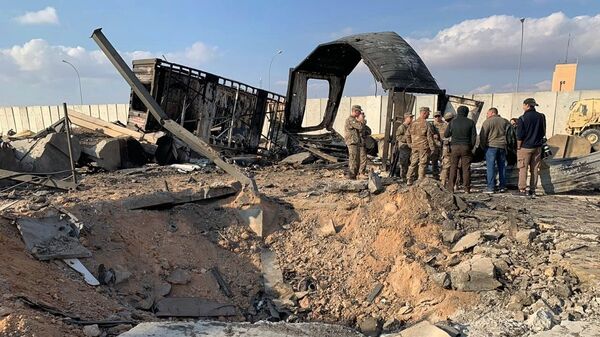Captain Bill Urban, spokesman for US Central Command (CENTCOM) confirmed earlier reports that 11 US servicemen were injured as a result of the attack that took place on 8 January. The servicemen were treated for concussion symptoms - 8 have been transported to Landstuhl Regional Medical Centre in Germany, and three more to Camp Arifjan in Kuwait.
As I'm tweeting, @CENTCOM just released this statement from Navy Capt. Bill Urban. Explains a bit more. 11/ pic.twitter.com/q3iie3hkYR
— Dan Lamothe (@DanLamothe) January 17, 2020
Earlier in the day, Defense One reported, citing US military command spokesman Col. Myles Caggins, that 11 American soldiers were airlifted to Kuwait and Germany after the attacks for treatment of various traumatic head injuries.
“Out of an abundance of caution, some service members were transported from Al Asad Air Base, Iraq to Landstuhl Regional Medical Center in Germany, others were sent to Camp Arifjan, Kuwait, for follow-on screening [...] When deemed fit for duty, the service members are expected to return to Iraq following screening. The health and welfare of our personnel is a top priority and we will not discuss any individual’s medical status", Caggins said, cited by Defense One.
An unnamed official said, according to Defense One, that some of the hospitalized soldiers may have suffered concussions during the Iranian strikes.
“About a week after the attack some service members were still experiencing some symptoms of concussion [...] We only got wind of this in the last 24 hours”, the official said.
Jeffrey Addicot, a retired Army officer and expert in national security law at St. Mary’s University School of Law in San Antonio, says he doesn't "perceive a glaring contradiction in the Trump Administration's initial report of no wounded soldiers in the Irainian assault".
"The term 'injury' is not the same as the term 'wounded in combat'. Wounded in combat operations generally refers to instances that are immediately obvious such as the tearing of flesh. Thus, a lower level injury is not generally considered as wounded. For example, a soldier who sprains an ankle running away from the missile blast would sustain an injury for sure but that injury would not be classified as wounded. On the other hand a full battle assessment (which takes days) may reveal a seriousness such as a severe concussion that may later qualify", Addicot explains.
Houchang Hassan-Yari, Professor of international relations and security issues at Sultan Qaboos University in Oman, in turn, thinks that the late announcement, at first glance, "appears as an attempt at cover-up up by the American government".
"However, this kind of injury is caused by the impact of an explosion and not a direct missile or any other projectile injury. This kind of injury can appear a few days or even a few weeks after the explosion. In the US, the cover-up does not have a long life because of the media and whistleblowers".
On 5 January, the Iraqi parliament approved a resolution that demanded the immediate and complete withdrawal of foreign troops from Iraq, in protest over the US drone attack that killed Soleimani.
American officials have repeatedly ruled out a complete pullback from Iraq. US Secretary of State Mike Pompeo indicated that he perfers slowly scaling down US forces in the country, now estimated at around 5,000-6,000 "to the extent we can use less American treasure and put fewer American lives at risk we ought to do that".
Pompeo suggested that he took some dozens of phone calls with various Iraqi senior officials who, privately, continue to welcome the American military presence in their country.




